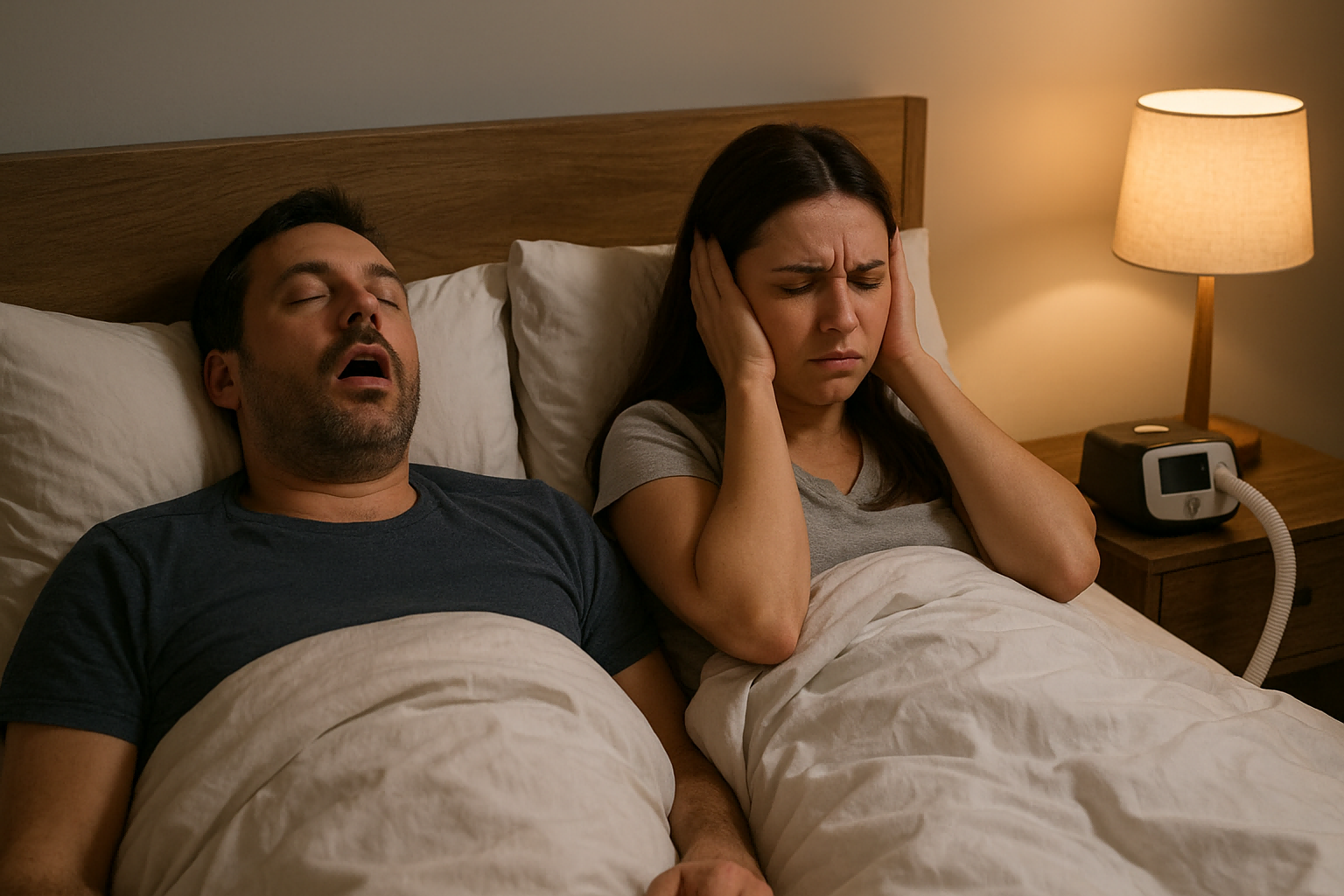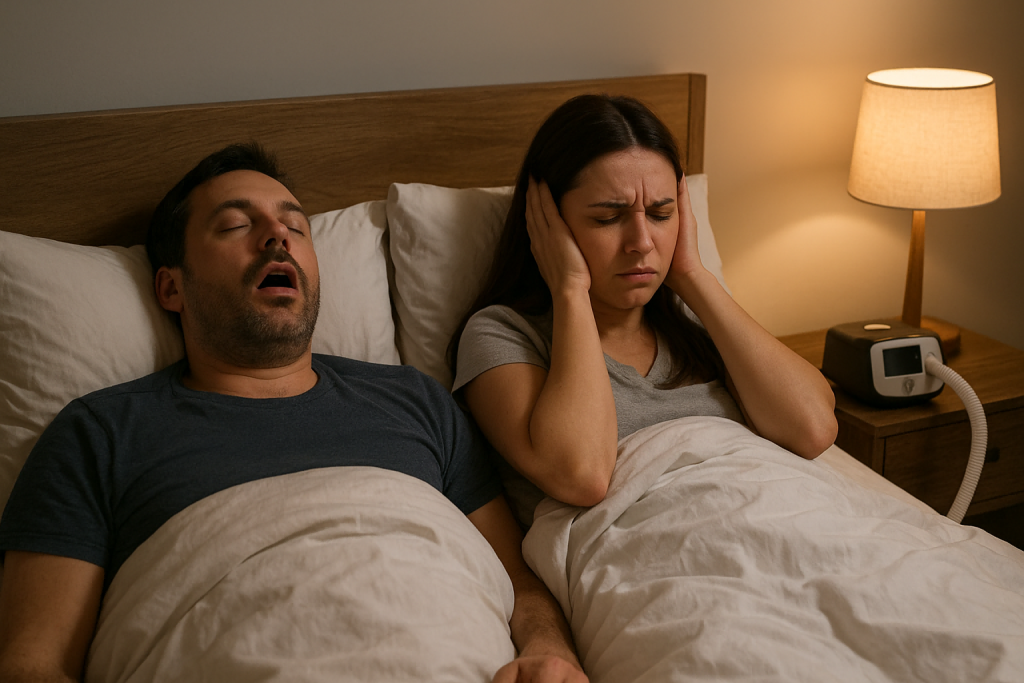Snoring and Sleep Apnea: Shocking Causes, Proven Treatments & Prevention Tips


Snoring and sleep apnea are two of the most common sleep-related issues, yet they are often misunderstood. While snoring may seem harmless, it can sometimes be a red flag for a more serious condition known as sleep apnea. Millions of people worldwide experience one or both of these problems, often without realizing the potential health consequences.
What is Snoring?
Snoring happens when airflow is partially blocked during sleep, causing tissues in the throat to vibrate. It can range from a mild inconvenience to a disruptive problem that affects both the sleeper and their partner. Occasional snoring is common, especially after alcohol consumption, colds, or fatigue. However, chronic snoring may signal underlying issues.
What is Sleep Apnea?
Sleep apnea is a serious sleep disorder where breathing repeatedly stops and starts during sleep. The most common form, obstructive sleep apnea (OSA), occurs when the muscles in the throat relax too much, blocking the airway. Unlike simple snoring, sleep apnea interrupts normal breathing, leading to oxygen drops and poor sleep quality.
Key Differences Between Snoring and Sleep Apnea
- Snoring: Noise without breathing pauses.
- Sleep Apnea: Snoring plus repeated breathing interruptions.
- Snoring Impact: Disturbs sleep partners.
- Sleep Apnea Impact: Poses major health risks, including heart disease and stroke.
Common Causes of Snoring and Sleep Apnea
Both conditions often share similar triggers.
Lifestyle Factors That Contribute
- Obesity and excess neck fat
- Alcohol and sedative use
- Smoking and nasal congestion
Anatomy of the Airway
A naturally narrow airway, large tonsils, or a deviated septum can increase risks.
Underlying Medical Conditions
- Hypothyroidism
- Allergies
- Chronic sinus problems
Health Risks Linked to Snoring and Sleep Apnea
Ignoring these issues can harm long-term health.
Impact on Heart and Brain Health
Sleep apnea increases the risk of high blood pressure, heart attacks, and strokes.
Sleep Deprivation and Daytime Fatigue
Constant interruptions in sleep lead to extreme tiredness and reduced focus.
Mental Health Implications
Depression, irritability, and anxiety are more common among those with untreated sleep apnea.
Diagnosis and Tests for Sleep Apnea
Detecting sleep apnea early is essential for preventing long-term complications. Thankfully, there are several diagnostic tools available.
Sleep Studies (Polysomnography)
A sleep study in a lab is considered the gold standard for diagnosing sleep apnea. It measures breathing, oxygen levels, brain waves, and heart activity overnight.
At-Home Sleep Tests
Portable devices now allow patients to undergo simplified sleep studies at home. These are less comprehensive but often effective for identifying moderate to severe cases.
When to See a Doctor
If you snore loudly, wake up choking or gasping, or experience extreme daytime fatigue, it’s time to consult a sleep specialist.
Effective Treatments for Snoring and Sleep Apnea
Thankfully, both snoring and sleep apnea can be managed with a mix of lifestyle changes, medical devices, and in some cases, surgery.
Lifestyle and Home Remedies
- Weight Management: Losing even 10% of body weight can significantly reduce symptoms.
- Sleeping Position: Sleeping on your side instead of your back can improve airflow.
- Avoiding Alcohol and Smoking: Both relax throat muscles and worsen snoring.
Medical Devices
- CPAP Machines: Continuous Positive Airway Pressure (CPAP) keeps the airway open and is the most effective treatment for moderate to severe sleep apnea.
- Oral Appliances: Custom mouthpieces reposition the jaw and tongue to prevent airway blockage.
Surgical Options
When other treatments fail, surgery may help by removing tissue, repositioning the jaw, or implanting nerve stimulators to keep airways open.
Natural Remedies and Alternative Therapies
For those seeking non-invasive approaches, natural solutions may provide relief.
Breathing Exercises and Yoga
Practicing deep breathing and yoga can strengthen airway muscles and improve lung capacity.
Essential Oils and Nasal Strips
Peppermint oil, eucalyptus, and nasal strips may help open nasal passages and reduce congestion.
Role of Diet and Hydration
A balanced diet and staying hydrated prevent throat tissues from becoming sticky and vibrating more during sleep.
Preventing Snoring and Sleep Apnea
Prevention often starts with lifestyle adjustments.
Sleep Hygiene Practices
Maintain a consistent bedtime, limit caffeine, and avoid heavy meals before bed.
Bedroom Environment Adjustments
Keep the room cool, use humidifiers, and reduce allergens like dust and pet dander.
Long-Term Lifestyle Changes
Regular exercise, avoiding late-night alcohol, and maintaining a healthy BMI significantly reduce risks.
Living with Snoring and Sleep Apnea
Coping with these conditions requires patience and awareness.
Supporting a Partner with Sleep Apnea
Encourage them to seek treatment, share sleep-friendly routines, and practice empathy.
Coping Strategies for Daily Life
Using relaxation techniques, sticking to therapy, and prioritizing rest can improve quality of life.
Frequently Asked Questions (FAQs)
1. Is snoring always a sign of sleep apnea?
Not always. While many with sleep apnea snore, not all snorers have sleep apnea.
2. Can children have sleep apnea?
Yes, especially if they have enlarged tonsils or obesity. Pediatric sleep studies can help diagnose it.
3. Does losing weight stop snoring?
For many people, yes. Weight loss reduces fat around the neck, opening up airways.
4. What happens if sleep apnea is left untreated?
It increases risks of heart disease, high blood pressure, stroke, and memory issues.
5. Can snoring be cured permanently?
Not always, but lifestyle changes, medical devices, or surgery can significantly reduce or eliminate it.
6. How do I know if I need a CPAP machine?
If diagnosed with moderate to severe sleep apnea, a doctor may recommend CPAP as the most effective treatment.
Conclusion: Taking Control of Snoring and Sleep Apnea
Snoring and sleep apnea are more than just sleep disruptions—they’re health risks that can impact your heart, brain, and overall well-being. The good news? With proper diagnosis, lifestyle changes, and treatments, you can reclaim restful sleep and protect your health.
If you or someone you love struggles with snoring or sleep apnea, don’t ignore the signs—take action today for a healthier tomorrow.
For more information, check out the American Sleep Apnea Association for expert resources.
















